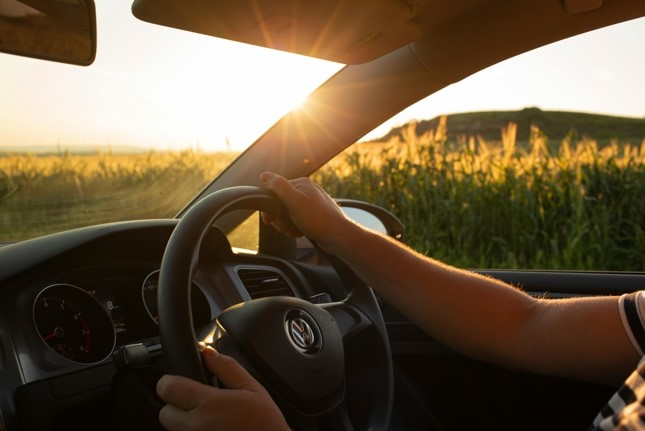It’s bad news for those who use poor weather conditions as an excuse for their bad driving habits. A new study has now revealed that three-quarters (76%) of vehicle incidents happen when the weather is clear.
ALD Automotive | LeasePlan UK‘s research shows that accidents are more likely to happen under clear blue skies rather than rainy clouds and icy roads. The analysis of over 72,000 insurance incidents has shown that just 6% of accidents were caused by rainy conditions. This figure reduces even further when considering foggy, icy, and snowy conditions.
However, the findings have also revealed that more than 9 in 10 (95%) people won’t admit liability at the time of the accident, despite 3 in 4 (75%) being at fault. Even law firms discourage people from admitting fault as they may not be aware of all the factors that caused the wreck, and admission could risk their right to compensation.
So why do more accidents happen in clear weather conditions, and are UK drivers to blame?
Unsurprisingly, in the UK drivers clock up almost 20% more miles in summer than any other time of year. With numerous bank holidays, staycations and festivals the UK road network can become seriously congested – and the frustration from sitting in traffic jams could also be partly to blame for the rise in summer incidents.

Our perception of risk appears to be weather-dependent
Chris Black, Commercial Director at ALD Automotive | LeasePlan UK, points out, “It seems that in poor weather conditions, drivers are far more mindful of potential hazards and adjust their driving accordingly. The problem is when the sun is shining, drivers seem to underestimate risks and potentially become complacent.
Drivers need to stick to safe driving practices at all times – maintaining appropriate speeds, avoiding distractions, and making regular checks on their vehicle’s condition.
Creating daily habits, before getting into your car or van – means taking a look at your tyres, clearing any clutter from dashboards, giving the windscreen a clean and topping up fluids. We’d always recommend keeping a pair of sunglasses to hand as low light as ‘glare’ is a factor in a number of accidents.
Setting out with time to spare is also key, as the many at-fault accidents are a result of drivers being in a hurry and driving recklessly – human error is a factor in 95% of incidents. Checking your route – especially important for EV drivers so they can factor in delays and charging stops can take the stress off and goes a long way to making for a safer and more relaxed journey.”
Many modern vehicles come equipped with advanced safety features such as lane-keeping assist, adaptive cruise control, and automatic emergency braking which can help improve driver safety.
Chris advises, “Drivers can use the features of their vehicles but must still anticipate potential dangers and know how to react appropriately in various traffic scenarios. This includes maintaining a safe following distance, being aware of other driver’s actions, and avoiding aggressive driving behaviours.”
Six expert tips to stay safe driving in good weather
- Check your tyres
“Rain after a warm spell can lead to slippery road surfaces, so exercise even more caution after a summer shower.
Checking your tyre pressure and tread on a regular basis is important, and I’d recommend setting a reminder on your phone and building in daily check to look for nicks, nails or ware in the tread.
Tyres that are lower than the legal requirement of 1.6mm could result in a hefty £2,500 fine per tyre and three points on your license.
- Keep your line of vision clean and clear
That includes clearing any clutter on your dashboard, making sure fluids are topped up and wipers are working – “a dirty windscreen can significantly obstruct your vision, particularly when the sunlight hits. Keep a pair of sunglasses handy at all times.”
- Top up the essential fluids
Oil, coolant and windscreen fluids should all be checked and topped up. Chris notes that “checking and maintaining your car’s fluid levels should be done regularly all year round; check your handbook but depending on mileage set a reminder on your phone repeating every month to check.”
- Don’t drive tired
Fatigue is a major contributor to crashes in the UK, so avoid driving when tired or feeling unwell.
This may seem obvious, but many drivers fail to realise they are fatigued when driving.
Chris shares, “Staying alert is the most important tip for drivers, especially during long drives or distracting car rides – with kids and pets, in particular. Take regular breaks, recommended every two hours, stretch your legs if you can – a short wander in the fresh air can really help to boost your energy.”
- Distracted driver
It goes without saying that drivers should also avoid distractions such as texting, eating, or adjusting the sat nav while driving. But that also goes for driving when you are feeling stressed or overwhelmed, you need to give 100% of your attention to the road.
- Plan your journey in advance
Chris notes that “checking the weather forecast, traffic conditions, and potential road closures can all help drivers avoid unexpected hazards and congestion. For EV drivers that also means option A and B for charging stops along the route.
Keep an emergency kit in your car with items such as a first aid kit, flashlight, water and reflective warning signs just in case you find yourself if the worst does happen.


